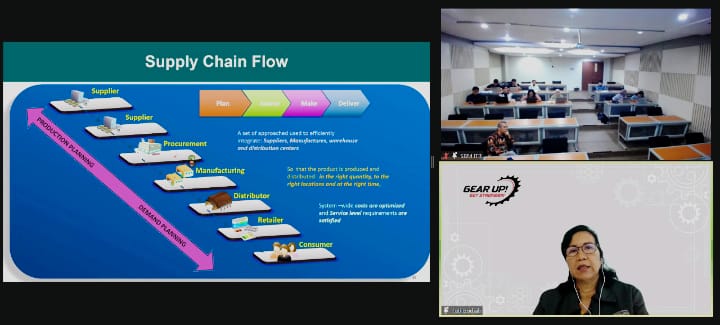Unlike other sectors, the pharmaceutical industry faces significant regulatory complexity, profoundly shaping its operations. Particularly in logistics, this sector requires highly trained and qualified transportation to uphold the quality of pharmaceutical products.
Tuti Susilowati G, Apt., MM, CISCP, the Deputy Director of Supply Chain at PT Kalbe Farma Tbk for thirteen years, emphasized that the pharmaceutical sector, exemplified by Kalbe, necessitates a cold product supply chain to ensure superior product quality. Stringent product monitoring is also imperative, as pharmaceutical items must reach consumers safely while retaining their therapeutic properties.
Tuti recently delivered a guest lecture entitled “Supply Chain Design: Implementation and Development in the Pharmaceutical Industry” at SBM ITB on Thursday (14/3). She stressed that the pharmaceutical industry’s supply chain must prioritize product safety, integrity, and quality, as these aspects directly impact the efficacy of pharmaceutical products.
Highlighting the myriad challenges in the pharmaceutical industry’s supply chain, Tuti underscored various factors. These include stringent quality requirements mandated by Indonesian government policies, Indonesia’s complex geographical landscape characterized by numerous islands, the quality of infrastructure for pharmaceutical and medical transportation (including transportation, pharmaceutical warehouses, and ports), and the imperative of cost efficiency in the pharmaceutical sector.
Navigating these challenges presents an opportunity to enhance profitability in the pharmaceutical industry by focusing on supply chain advancements. Several considerations are crucial to this end.
First, effective pharmaceutical product inventory management is essential, requiring improved demand forecasting, planning, collaboration, and integration. Second, implementing mechanisms for timely replenishment of pharmaceutical products is vital to prevent stockouts. Third, developing comprehensive plans for the sales and operations planning process involves evaluating inventory, marketing strategies, monthly pharmaceutical stock.
Moreover, the transportation of pharmaceutical products is critical to maintaining product quality until they reach consumers. Additionally, establishing warehouses for pharmaceutical storage demands attention to labour costs, control measures, space utilization, and technological integration. By optimizing these five aspects, companies can undoubtedly achieve profitability.





